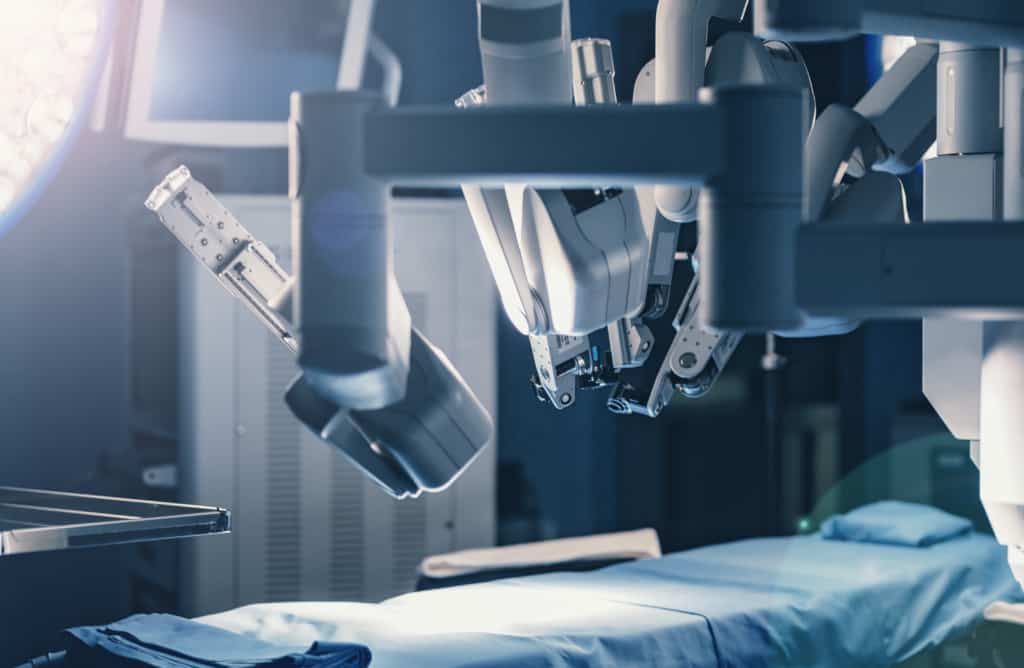Minimally Invasive Surgery
 Minimally invasive laparoscopic and robotic surgery have grown in popularity over the past 20 years. Today, surgeons are increasingly performing these procedures to treat a wide array of complex conditions once traditionally reserved for more open or invasive surgeries.
Minimally invasive laparoscopic and robotic surgery have grown in popularity over the past 20 years. Today, surgeons are increasingly performing these procedures to treat a wide array of complex conditions once traditionally reserved for more open or invasive surgeries.
Benefits of minimally invasive surgery are significant for patients compared to traditional open surgery. These benefits include:
- Decreased pain
- Reduced scarring
- Low risk of infection
- Less blood loss
- Short hospital stay
- Faster and safer return to work
Minimally invasive surgery owes its origins to gynecologists who used it for diagnostic purposes in the 1960’s. As clinical experience progressed and laparoscopic surgical tools evolved, surgeons began to perform more complex operations.
At the end of the 1980’s, general surgeons started adopting laparoscopic methods, and today, minimally invasive treatments are performed for many conditions. Examples include:
- Gallbladder removal
- Hernia repair
- Esophagus/hiatal hernia
- Liver/pancreas resection
- Appendix removal
- Adrenalectomy
- Colorectal
- Bariatric surgery, i.e. gastric bypass and sleeve gastrectomy
- Cancer operations
What Is Minimally Invasive Surgery and How Does It Work?
Generally regarded as safer than traditional open surgery, the methods used in minimally invasive surgery allow your surgeon to limit the size and number of incisions needed during any given procedure.
During open surgery, the surgeon makes a single large incision to view the entire area of the body being operated on. By contrast, during minimally invasive surgery, specialized tiny devices, cameras, and lights that fit through small cuts in the skin allow the surgeon to perform the procedure without impacting the surrounding skin and muscles.
Minimally invasive procedures can also be performed using robotic technology that allows increased control and precision during surgery.
Recovery time for each patient varies depending on the type of disease, medical history, and lifestyle. However, after minimally invasive surgery, patients typically heal quicker, leave the hospital sooner, and recover better than with traditional open surgery.
How Does Robotic-Assisted Surgery Work?
Cutting-edge robotic systems provide surgeons with more control and broader visibility during surgery, making the procedure safer, less invasive, and precise. During robotic-assisted surgery, a surgeon operates from a console that can control up to four robotic arms. Stereoscopic, 3D imaging technology allows the surgeon to view the surgical procedure better than ever.
Computer software guides the surgeon’s hand movements making them more precise and targeted. Not all minimally invasive procedures require robot assistance, and not all medical cases are suitable for robotic-assisted surgery. Patients should consult their physician to educate themselves about all options before deciding on a course of treatment.
Our team specializes in advanced gastrointestinal procedures, minimally invasive surgery, and bariatric surgery. With our advanced skills, we can safely and successfully perform almost any operation in a minimally invasive fashion.
To learn more about the types of minimally invasive and robotic-assisted procedures we offer, or to obtain a second opinion if you wish to have your procedure in a minimally invasive technique, please feel free to contact us.


Sign Up for Our Newsletter to Get the Latest Updates
Sign Up for Our Newsletter to Get the Latest Updates
Oviedo/Winter Springs
(Inside Medical Office Building)
8400 Red Bug Lake Road
Suite 2090
Oviedo, FL 32765
Sanford Office
2100 West 1st Street
Sanford, FL 32771
Hospital Privileges at AdventHealth, HCA Lake Monroe Hospital, Orlando Health, Oviedo Medical Center, and UCF Lake Nona Hospital

